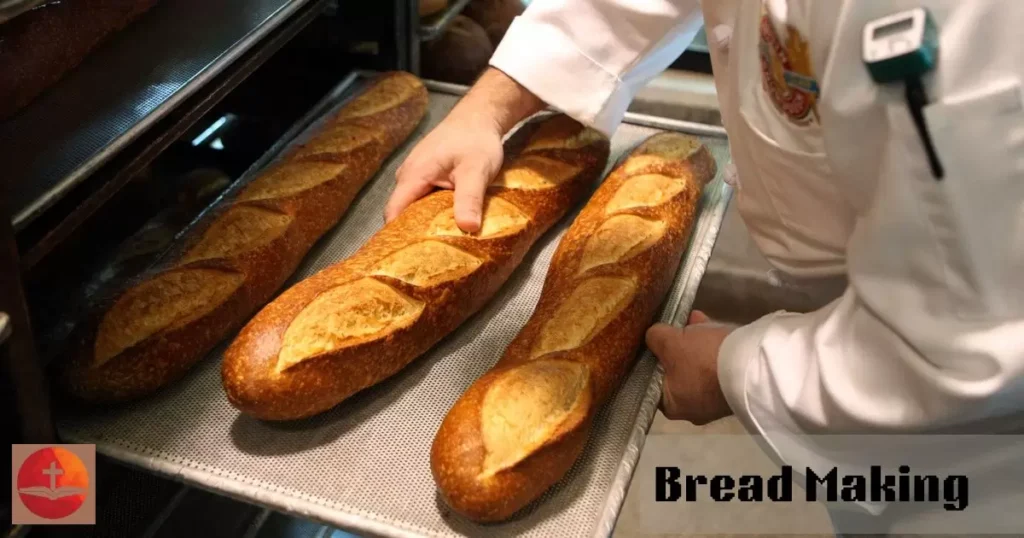“Explore how Bible verses about cooking and food provide deeper spiritual insights into nourishment and meals.”
Food and cooking are fundamental aspects of human life, deeply intertwined with daily routines, traditions, and celebrations. In the Bible, food is not just a source of physical nourishment but also holds significant spiritual meaning.
From the blessings of a meal to the symbolism of various foods, scripture offers rich reflections on how meals can draw us closer to God. This article delves into 45 Bible verses that connect cooking and food with spiritual lessons, offering insights into how nourishment goes beyond the physical to touch the divine.
1. Genesis 1:29
“Then God said, ‘I give you every seed-bearing plant on the face of the whole earth and every tree that has fruit with seed in it. They will be yours for food.'”
God’s provision of plants and fruits emphasizes His care for our physical nourishment. This verse highlights the importance of divine provision in our daily sustenance.
2. Genesis 18:6
“So Abraham hurried into the tent to Sarah. ‘Quick,’ he said, ‘get three seahs of the finest flour and knead it and bake some bread.’”
Abraham’s preparation of bread for his guests reflects hospitality and the value of generosity in sharing meals, illustrating the spiritual importance of fellowship.
3. Exodus 16:4
“Then the Lord said to Moses, ‘I will rain down bread from heaven for you. The people are to go out each day and gather enough for that day. In this way I will test them and see whether they will follow my instructions.’”
The manna from heaven symbolizes God’s daily provision and faithfulness. This provision teaches reliance on God for our needs and the importance of obedience to His commands.
4. Leviticus 11:3
“You may eat any animal that has a divided hoof and that chews the cud.”
The dietary laws of the Old Testament, such as eating clean animals, reflect God’s concern for holiness and order in all aspects of life, including food.
5. 1 Samuel 1:9-11

“Hannah rose after they had finished eating and drinking in Shiloh. Now Eli the priest was sitting on his chair by the doorpost of the Lord’s house. In her deep anguish Hannah prayed to the Lord, weeping bitterly.
And she made a vow, saying, ‘Lord Almighty, if you will only look on your servant’s misery and remember me, and not forget your servant but give her a son, then I will give him to the Lord for all the days of his life, and no razor will ever be used on his head.’”
Hannah’s meal in the context of her deep prayer illustrates the intersection of physical nourishment and spiritual devotion, showing how meals can be linked to significant spiritual commitments.
6. 1 Kings 19:6
“He looked around, and there by his head was some bread baked over hot coals, and a jar of water. He ate and drank and then lay down again.”
God provided bread and water for Elijah, symbolizing His provision and care in times of physical and emotional weakness.
7. Psalm 104:14-15
“He makes grass grow for the cattle, and plants for people to cultivate— bringing forth food from the earth: wine that gladdens human hearts, oil to make their faces shine, and bread that sustains their hearts.”
This verse reflects on God’s provision of food and drink, highlighting the joy and sustenance that come from His creation.
8. Proverbs 15:17
“Better a small serving of vegetables with love than a fattened calf with hatred.”
Love and relationship quality in sharing meals are emphasized here, showing that the manner in which food is shared is as important as the food itself.
9. Proverbs 25:27
“It is not good to eat too much honey, nor is it honorable to search out matters that are too deep.”
Moderation in consumption and behavior is advised, highlighting the need for balance in enjoying the blessings of food.
10. Isaiah 55:1-2
“‘Come, all you who are thirsty, come to the waters; and you who have no money, come, buy and eat! Come, buy wine and milk without money and without cost. Why spend money on what is not bread, and your labor on what does not satisfy? Listen, listen to me, and eat what is good, and you will delight in the richest of fare.’”
God invites us to partake in spiritual nourishment that truly satisfies, contrasting with the fleeting satisfaction of worldly pursuits.
11. Matthew 4:4
“Jesus answered, ‘It is written: Man shall not live on bread alone, but on every word that comes from the mouth of God.’”
Jesus teaches that spiritual nourishment is as essential as physical food, emphasizing the importance of God’s Word for sustaining life.
12. Matthew 14:19
“And he directed the people to sit down on the grass. Taking the five loaves and the two fish and looking up to heaven, he gave thanks and broke the loaves. Then he gave them to the disciples, and the disciples gave them to the people.”
Jesus’ miracle of feeding the 5,000 shows the power of thankfulness and provision. This event underscores the significance of sharing and trust in God’s ability to provide.
13. John 6:35
“Then Jesus declared, ‘I am the bread of life. Whoever comes to me will never go hungry, and whoever believes in me will never be thirsty.’”
Jesus as the bread of life represents spiritual fulfillment, offering eternal nourishment and satisfaction beyond physical food.
14. Acts 2:46
“Every day they continued to meet together in the temple courts. They broke bread in their homes and ate together with glad and sincere hearts.”
The early church’s practice of breaking bread together reflects fellowship and joy in communal meals, enhancing spiritual connections through shared experiences.
15. Acts 10:13-15
“Then a voice told him, ‘Get up, Peter. Kill and eat.’ ‘Surely not, Lord!’ Peter replied. ‘I have never eaten anything impure or unclean.’ The voice spoke to him a second time, ‘Do not call anything impure that God has made clean.’”
God’s vision to Peter signifies a new understanding of dietary laws, illustrating the transformation in how we perceive and engage with food.
16. Romans 14:17
“For the kingdom of God is not a matter of eating and drinking, but of righteousness, peace, and joy in the Holy Spirit.”
Spiritual values like righteousness, peace, and joy surpass physical concerns about food and drink, highlighting the priority of spiritual well-being.
17. 1 Corinthians 10:31
“So whether you eat or drink or whatever you do, do it all for the glory of God.”
Glorifying God in all activities, including eating and drinking, emphasizes that everyday actions can reflect our faith and devotion.
18. Philippians 4:19
“And my God will meet all your needs according to the riches of his glory in Christ Jesus.”
God promises to meet our needs, including those related to food and provision, reflecting His generosity and care.
19. Colossians 3:17
“And whatever you do, whether in word or deed, do it all in the name of the Lord Jesus, giving thanks to God the Father through him.”
Every action, including mealtime, should be done with gratitude and honor to God, reflecting our faith in daily routines.
20. 1 Timothy 4:4-5
“For everything God created is good, and nothing is to be rejected if it is received with thanksgiving, because it is consecrated by the word of God and prayer.”
All food is good when received with thankfulness, acknowledging God’s provision and blessing over it.
21. Hebrews 13:9
“Do not be carried away by all kinds of strange teachings. It is good for our hearts to be strengthened by grace, not by eating ceremonial foods, which are of no benefit to those who do so.”
Spiritual strength comes from grace, not ritualistic food practices, emphasizing the heart’s condition over dietary laws.
22. Revelation 3:20
“Here I am! I stand at the door and knock. If anyone hears my voice and opens the door, I will come in and eat with that person, and they with me.”
Jesus’ offer to dine with us signifies intimate fellowship and the spiritual nourishment found in a relationship with Him.
23. Genesis 2:16-17
“And the Lord God commanded the man, ‘You are free to eat from any tree in the garden; but you must not eat from the tree of the knowledge of good and evil, for when you eat from it you will certainly die.’”
The command about the tree highlights obedience in our choices and the consequences of disobedience, symbolizing spiritual nourishment.
24. Psalm 78:24-25
“He rained down manna for the people to eat, he gave them the grain of heaven. Human beings ate the bread of angels; he sent them all the food they could eat.”
Manna represents God’s miraculous provision and nourishment, a reminder of His faithfulness in sustaining His people.
25. Matthew 26:26
“While they were eating, Jesus took bread, and when he had given thanks, he broke it and gave it to his disciples, saying, ‘Take and eat; this is my body.’”
The Last Supper and communion with bread symbolize Jesus’ sacrifice and the spiritual sustenance available through His body.
Bible Verses in the Book of Ezekiel: Key Teachings and Revelations
26. Luke 24:30
“When he was at the table with them, he took bread, gave thanks, broke it and began to give it to them.”
Jesus’ act of breaking bread after His resurrection demonstrates the importance of fellowship and revelation in shared meals.
27. John 6:11
“Jesus then took the loaves, gave thanks, and distributed to those who were seated as much as they wanted. He did the same with the fish.”
Jesus’ thankfulness and provision for the multitude illustrate the importance of gratitude and the abundance of God’s blessings.
28. John 21:9-13
“When they landed, they saw a fire of burning coals there with fish on it, and some bread. Jesus said to them, ‘Bring some of the fish you have just caught.’ So Simon Peter climbed back into the boat and dragged the net ashore.
It was full of large fish, 153, but even with so many the net was not torn. Jesus said to them, ‘Come and have breakfast.’ None of the disciples dared ask him, ‘Who are you?’ They knew it was the Lord. Jesus came, took the bread and gave it to them, and did the same with the fish.”
Jesus’ provision of fish and bread for His disciples after His resurrection underscores the significance of fellowship and provision in the Christian life.
29. Acts 27:34
“Now I urge you to take some food. You need it to survive. Not one of you will lose a single hair from his head.”
Paul’s encouragement to the ship’s passengers to eat illustrates the necessity of physical sustenance for survival and the reliability of God’s protection.
30. 1 Corinthians 11:24
“and when he had given thanks, he broke it and said, ‘This is my body, which is for you; do this in remembrance of me.’”
The act of breaking bread in remembrance of Jesus emphasizes reflection on His sacrifice and spiritual nourishment through communion.
31. 2 Corinthians 9:10
“Now he who supplies seed to the sower and bread for food will also supply and increase your store of seed and will enlarge the harvest of your righteousness.”
God’s provision of seed and bread signifies His ability to provide and bless abundantly, reflecting His support for both physical and spiritual needs.
32. James 1:17
“Every good and perfect gift is from above, coming down from the Father of the heavenly lights, who does not change like shifting shadows.”
Every blessing, including food, is a gift from God, highlighting His unchanging and generous nature.
33. Psalm 23:5
“You prepare a table before me in the presence of my enemies. You anoint my head with oil; my cup overflows.”
God prepares a table and provides abundance even in the midst of adversity, symbolizing His care and protection.
34. Isaiah 25:6
“On this mountain the Lord Almighty will prepare a feast of rich food for all peoples, a banquet of aged wine—the best of meats and the finest of wines.”
God’s future banquet symbolizes the ultimate spiritual feast and fulfillment that awaits the faithful.
35. Ezekiel 4:9

“Take wheat, barley, beans, lentils, millet, and spelt; put them in a storage jar and use them to make bread for yourself.”
Ezekiel’s instructions on bread-making reflect the significance of preparation and obedience in fulfilling God’s commands.
36. Matthew 6:11
“Give us today our daily bread.”
The Lord’s Prayer includes a request for daily bread, emphasizing our dependence on God for sustenance and provision.
37. Luke 11:3
“Give us each day our daily bread.”
Similar to Matthew’s account, this verse underscores the importance of asking God for daily needs and trusting in His provision.
38. Deuteronomy 8:3
“He humbled you, causing you to hunger and then feeding you with manna, which neither you nor your ancestors had known, to teach you that man does not live on bread alone but on every word that comes from the mouth of the Lord.”
God’s provision of manna teaches the lesson that spiritual nourishment is as crucial as physical food.
39. Jeremiah 15:16
“When your words came, I ate them; they were my joy and my heart’s delight, for I bear your name, Lord God Almighty.”
Jeremiah’s metaphor of eating God’s words highlights the deep satisfaction and joy found in spiritual nourishment.
40. Lamentations 3:24
“I say to myself, ‘The Lord is my portion; therefore I will wait for him.’”
God as our portion signifies His role in providing and nourishing us spiritually and physically.
41. Proverbs 9:5
“‘Come, eat my food and drink the wine I have mixed.’”
Wisdom’s invitation to partake in her feast symbolizes the nourishing benefits of pursuing wisdom and understanding.
42. John 4:34
“My food is to do the will of him who sent me and to finish his work.”
Jesus speaks of His spiritual food as fulfilling God’s will, highlighting that obedience and purpose are central to spiritual nourishment.
43. Psalm 104:15
“Wine that gladdens human hearts, oil to make their faces shine, and bread that sustains their hearts.”
God’s provision of wine, oil, and bread highlights the comprehensive nature of His blessings for both physical and emotional well-being.
44. Acts 27:35
“After he said this, he took some bread and gave thanks to God in front of them all. Then he broke it and began to eat.”
Paul’s act of giving thanks before eating demonstrates the importance of gratitude and acknowledging God’s provision.
45. Revelation 2:17
“To the one who is victorious, I will give some of the hidden manna. I will also give that person a white stone with a new name written on it, known only to the one who receives it.”
The promise of hidden manna signifies spiritual nourishment and reward for the faithful who overcome challenges.
Answers To Key Questions About Cooking and Food:
1. What do Bible verses about food teach us?
They teach us about God’s provision, the importance of gratitude, and the spiritual significance of meals and nourishment.
2. How can I apply these verses to my daily life?
By recognizing God’s provision in our meals, practicing gratitude, and understanding the deeper spiritual lessons behind food.
3. Are there spiritual meanings behind certain foods in the Bible?
Yes, certain foods symbolize spiritual truths, such as bread representing Jesus’ body and manna symbolizing God’s provision.
4. How can food and cooking be a form of worship?
Food and cooking can be acts of worship by acknowledging God’s provision, practicing hospitality, and reflecting His love through shared meals.
5. What is the significance of breaking bread in the Bible?
Breaking bread signifies fellowship, thankfulness, and remembrance of Jesus’ sacrifice and provision.
6. How do Bible verses on food enhance our understanding of God’s care?
They illustrate how God provides for our needs, encourages gratitude, and reveals spiritual truths through everyday acts like eating and sharing meals.
Conclusion
Bible verses on cooking and food offer profound insights into how our daily nourishment reflects deeper spiritual truths. From God’s provision to the symbolism of meals, these scriptures enrich our understanding of how food can be a channel for experiencing and expressing God’s care.
By integrating these spiritual reflections into our lives, we recognize the sacredness in our meals and the importance of gratitude, fellowship, and divine provision. Embracing these biblical lessons helps us see our daily bread as more than just physical sustenance but as a symbol of God’s enduring love and faithfulness

Hi! I’m Jane Austen, a writer passionate about exploring the stories and teachings of the Bible. On my website, BiblePulze, I share insights and reflections to help readers deepen their understanding of the Bible and its relevance to our lives today. I strive to make biblical teachings accessible and engaging for everyone.

